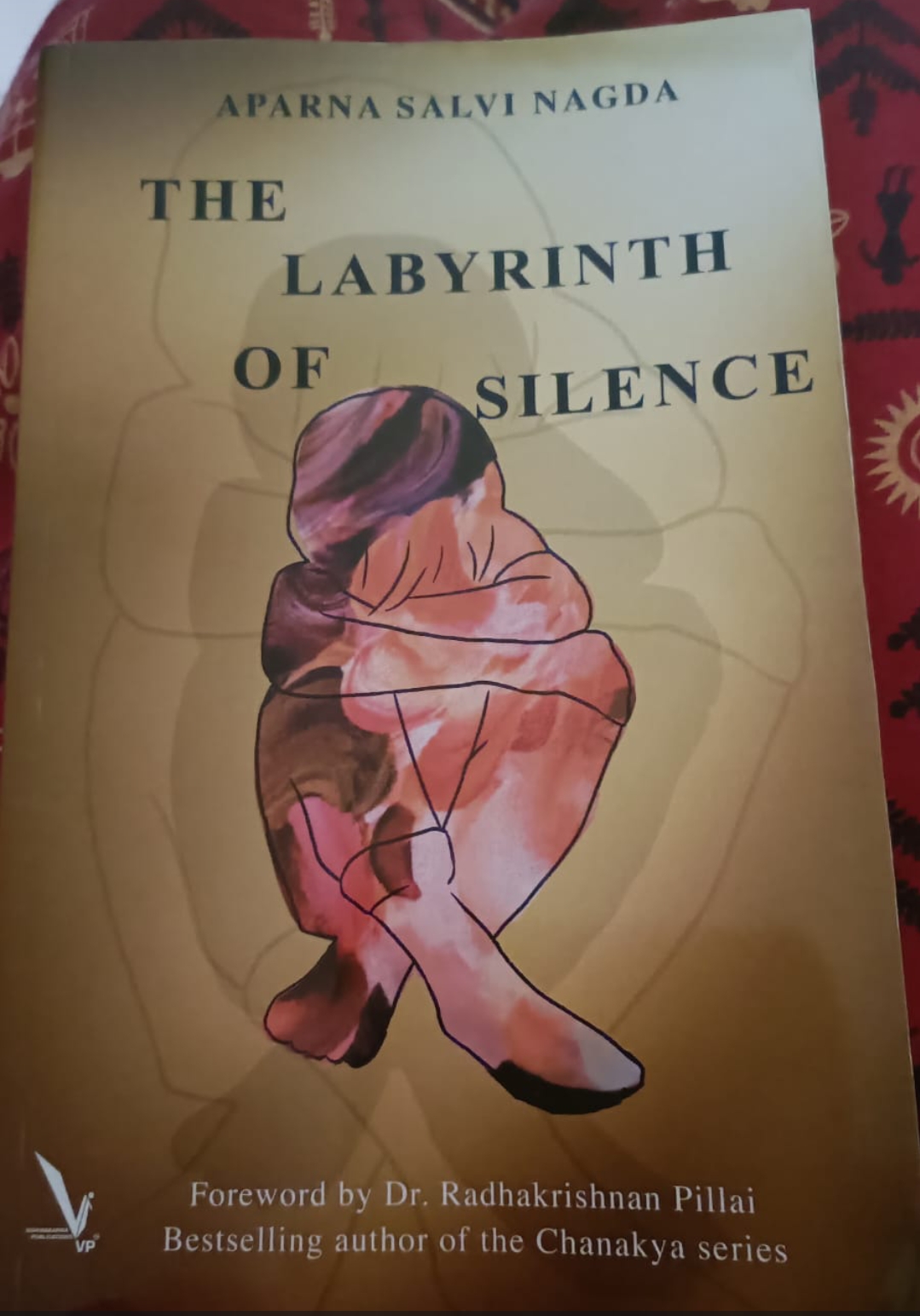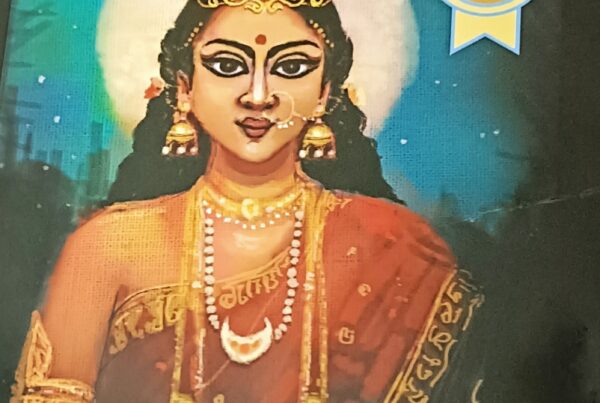Book – The Labyrinth of Silence
Author – Dr Aparna Salvi Nagda
Publisher – Vishwakarma Publications
Length – 205 pages (all included)
Genre – Social drama
There are books which leave you with a sweet, sated aftertaste, and then there are books which make you ponder, question, debate and discuss. Dr Aparna Salvi Nagda’s debut novel, The Labyrinth of Silence, is one of the latter. Set in the 1990s in Tilakwadi, a small municipality in the Belagavi (Belgaum) district of Karnataka, this novel seeks to explore the lives, loves, travails and triumphs of Muki, Girish, Kashi and Narmada – its four main characters. And in the process, offers a deeply personal and poignant account of their journey which reverberates with the sound of silence.
The graphic cover of the book well reflects the helplessness of the protagonists, trapped as they are within the silent labyrinths of their minds. The very compelling foreword by Dr Radhakrishnan Pillai prepared me for an intense read – and I was not disappointed. The Prologue written in the epistolary mode was an effective way of whetting the reader’s curiosity. It had smatterings of information that were intrinsically connected to the main plot, without giving out too much. Thus, Dr Aparna had me ready to dive into the story headlong!
Structurally, the chapters are short and hence, easy to read. The history of Belgaum mentioned in the beginning, makes for an interesting and informative read. The author has used the socio-political unrest along the Karnataka-Maharashtra border in the 1980s and 90s, both as a background and a fulcrum for the narrative. The fine detailing of cuisine, attire, customs, language, and mannerisms bear testimony to her meticulous research. Small towns like Dharwad, Belgaum, Benaras, and Baknur have come alive on these pages.
Dissing the adage of what’s in a name, the author has coined each name that becomes an extension of the character’s personality. Thus Muki, the young starry-eyed servant girl of lowly birth, is physically non-verbal (mute) but has a sharp, sensitive soul who reads others’ minds like a pro. Girish is a successful architect by profession but like his name, he remains rigid, stony and unmoved. His scarred childhood makes him incapable of breaking out of his rock-like silence and frigidity. Since the seed for young Kashi was sown in Benaras, it is here that she finds her truth and liberation – the holy land and the sublime Ganga calm her turbulent, rebellious mind, answer her questions, and she returns to Belgaum wiser, more evolved and accepting. And resembling her riverine namesake, Narmada symbolises the ebb and flow of emotions, of passion, and finally, the drying up of life itself.
Aparna has invested her characters with a wealth of emotions and expressions. The novel is primarily character-driven and the writer has crafted each of them with care and finesse. Silence remains a leitmotif throughout the narration. It invades the lives of all the primary players, in both direct and indirect forms – be it the physical handicap of Muki, the poverty-stricken plight of Venky, the demons of Girish’s childhood which render him a recluse, the guilt and helplessness of Narmada to reboot her destiny, the occasional bouts of reticence in Kashi as she grapples with her baggage of uncertainties, or even the enigmatic silence of Kusum in her final harrowing days. Each of the characters is authentic, unique, and leaves an enduring imprint on the reader’s mind.
Aparna’s literary endeavour is more than mere story-telling. Social concerns occupy centre stage in her novel. The rich-poor divide makes Muki austerely maintain a distance of five feet from every Kulkarni, even her own husband. The Kannada-Maratha divide festers bitterness and alienation, in both the social and familial circuit. The evils of child abuse are portrayed with a heart-wrenching realism. But worse than the abuse is the act of Kusum gaslighting the young, traumatised Girish in her bid to preserve the family honour. And topping them all is the loathsome practice of Niyog where a woman is forced to engage in a sexual relation with a man other than her husband, in order to beget an heir. However, it is to the author’s credit that she does not take sides or pass judgements on these issues. She gently holds a mirror to them – as mindful, perceptive readers, it is incumbent on us to act appropriately on them.
As a writer, Dr Aparna is blessed with vivid imagination and vocabulary which come to the fore in this fiction. Through her words we visualise the tropical gecko, the desolate snow-covered Karakoram, the swollen Ganga, the opulent but cursed Kulkarni mansion, Venky’s decrepit cycle rattling down the streets, the funereal Manikarnika ghats, and the bustling markets of Angol. She has a penchant for tingling all our senses through her abundant use of simile, metaphor, imagery, and other literary devices. A few memorable lines which have stayed with me are listed below:
The roads cared for none, yet courted all.
Tables turn and fate misleads, but those born with iron arms toil in their graves, too.
The mansion stole her words, crushed her dreams, and twisted her tongue.
It was indeed a privilege to be a living fossil.
Convenience is a scapegoat. It can be later blamed for every mishap and misdeed.
Having said that, as a reader, I found multiple instances of redundancy and repetition in the text. Also, the heavily lyrical prose, at times, impeded the narrative pace and tenor.
Dr Aparna’s labour of love is a robust reminder of the power of silence and a soul-stirring tribute to all those caught in its icy snare. It leaves us feeling bristled, uncomfortable, and embarrassed for turning a blind eye to the heinous practices that plague our ecosystem even today. It delves deep into the human psyche and lays bare its vulnerabilities, insecurities, and forbidden longings. However, all is not dark and gloomy here. Muki, with her powerful and pregnant silences, speaks volumes. The plot is dotted with small joys and triumphs – Muki finally finds acceptance and respect amongst her people, Kashi and Muki share an inseparable bond, little Kashi’s adorable antics make Girish touch base with his humane side, and finally, Kashi comes to terms with her true identity. The novel ends on a note of optimism, resilience, fresh beginnings, and hails the transformative potential of love, patience and perseverance.









